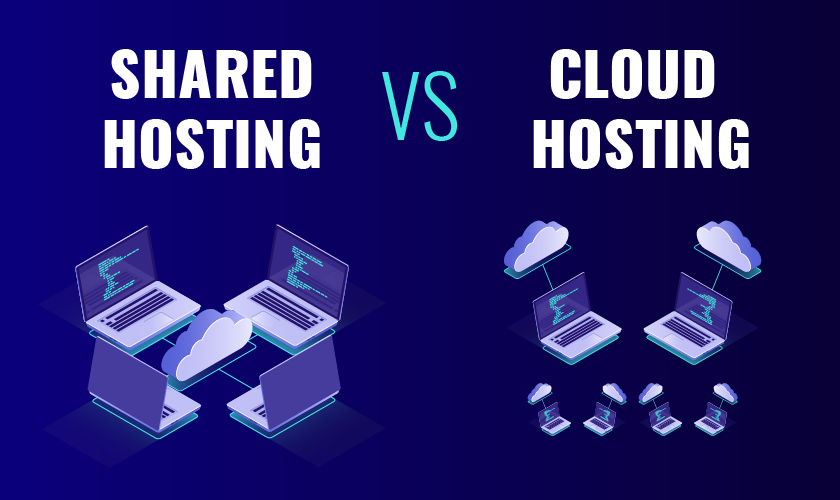
TABLE OF CONTENTS
In this article, I’ll show you cloud hosting vs shared hosting major difference. We are used to seeing the word 'cloud' stuck out there in front of basically every technological term. And while tech-savvy people have a proper understanding of what 'the cloud' is, the same can not be said for all its potential applications.
What is Cloud hosting?
A cloud server is a virtual server, running in a cloud computing environment (rather than a physical server). It is built, hosted, and delivered over the internet via a cloud computing platform and is accessible remotely. Also, they're known as virtual servers. The Cloud is the critical differentiator of cloud hosting at its most basic level. No prizes for that section. Just like cloud computing, cloud hosting gets its name because it draws computing power from "the cloud," i.e. a pool of dynamically allocated resources over a large network of physical components, rather than a fixed set of hardware. In theory, cloud hosting is infinitely scalable, as it allows an unlimited number of machines to act effectively as a single system. Multiple physical servers are pooled together and presented as one machine to the website or application by leveraging virtualization. Cloud Hosting benefits mirror many of the advantages of other cloud computing services, such as improved reliability and redundancy, higher performance, and scalability on demand. All of these are particularly suitable for websites where a major new product launch or viral video's unexpected success can send in a matter of minutes flocks of new customers to a website. Where regular hosting could break under the jump in workload (depending, of course, on how much resource is permanently allocated to the site), with cloud hosting, the resources of the website can automatically scale up to meet the demand. That means you're always ready for the unexpected. Resource pooling also lends itself well to redundancy in the website. With your website hosting multiple servers instead of just one, failure on one server will not cause your site to fail. Any slack left by a downed server is picked up automatically by other cloud servers. If these servers struggle, it will automatically bring additional servers online to accommodate them. In the end, cloud hosting is designed to deliver the guaranteed level of service your website requires.
Best Cloud Hosting
Here is the list of the best cloud hosting: SiteGround– for scaling resources. HostGator– cheap cloud web hosting. DreamHost– for developer projects. A2 Hosting – Fastest cloud web hosting. InMotion – for small businesses.
What is Shared Hosting?

Shared hosting permits the use of a single server on multiple websites. Usually, you will have no idea with whom or with which websites you are sharing a server's resources. Usually, each customer will have a limit on the total amount of server resources that they can use, but your hosting package will define that. Shared hosting is simply the cheapest and most cost-effective option for your needs. The cheap price comes with constraints, though, which we'll get to below. Since most hosting companies will be offering the same amount of space and storage, choosing a company you can trust is important.
By contrast, shared hosting is a web hosting solution where each client receives a portion of the same physical server hardware to run their website or application. Shared hosting is often the most cost-effective way to get a project online, as the service provider houses multiple clients on a single web server, resulting in lower overall costs.
While shared hosting can be a perfect platform for less demanding projects as a cost-effective one, it certainly has its limits. With multiple clients sharing one set of physical hardware, individual users can not rely on a guaranteed server performance level.
This may not be a problem for sites and applications with minimal requirements or low visitor numbers but many users find that shared hosting is not up to snuff when it comes to running intensive, business-critical processes.
Cloud Hosting vs Shared Hosting
Now, we are going to discuss cloud hosting vs shared hosting. The website of your business is all — if it's down, your brand and the bottom line could be greatly affected. There are several web hosting companies that can give your website different types of hosting. These options range from virtual private servers (VPS) to standard hosting for shared use.

One of the major distinctions between shared and cloud web hosting in these services is. Both these services are tiered at a similar level, providing basic functions for web hosting, but through entirely different processes. While some might argue that one is better than the other, the kind of hosting that works for your business largely depends on your individual needs.
Cloud Hosting vs Web Hosting
The difference between shared hosting and cloud hosting lies in the organization of each. Shared hosting servers are servers that contain multiple websites. Web hosting companies are building and maintaining those servers and putting a bunch of websites on them. This means that if your website is hosted on a shared server, it is fighting as many other websites for the same resources. Some companies are packaging a tonne of websites on each server which may throttle the speed and performance of your website. It can also present certain safety limitations.
Cloud hosting is a multiple-server service. Your site is hosted in the cloud, rather than on one shared server. This means that the company can bounce the hosting of your website between servers as it adapts to performance spikes and other stresses. Cloud hosting is more dynamic than shared hosting, which means it can perform better than some shared hosting services and be more secure.
Cloud Hosting vs Shared Hosting: Which one is better?
The service for your business which works better will depend on your needs. Shared web hosting may be a great option for your business if you are looking for an inexpensive hosting option that has solid features and can handle your current traffic levels.
"Shared hosting is the traditional hosting method, and can be a good cost-effective option for many small businesses," said Rollins. "When it comes to functionality, it can be easier to use too."
Cloud hosting is ideal if you are experiencing high traffic or spikes during visits or if you need comprehensive safety features. Rollins recommended cloud hosting services for high-traffic demanding e-commerce businesses and businesses.
Cloud hosting is a good option if you have a very large site with lots of resources in the back end and are experiencing speed issues.
Shared Hosting, VPS, or Cloud Hosting: Which Should You Do?
Given its performance and scalability benefits, one thing to consider with cloud hosting is that it's significantly more expensive than shared hosting services. Some shared hosting plans can be bought for just a few dollars a month, while cloud hosting plans will cost you closer to $15-$20 a month.
Like any service, you're getting what you're paying for and Rollins said business owners should consider their priorities before looking at web hosting. Cloud hosting services are packed with more security and performance features, while shared hosting services can deliver the deal for a basic website that a small business needs.
Cloud Hosting vs Dedicated Hosting: Cloud hosting providers give scalable resource allocation based on hardware virtualization, while dedicated server plans include a fixed allocation of isolated RAM, CPU, & SSD / HDD storage capable of delivering better performance and higher security for online business apps.
Cloud Hosting vs VPS: A VPS hosting environment is similar to cloud servers. The key difference is that the resources are spread among a bunch of different physical machines instead of having a single server dedicated to your site (as is the case with VPS). Cloud servers are similar to a VPS hosting environment. The key difference is that instead of having a single server dedicated to your site (as is the case with VPS), resources are spread among a bunch of different physical machines. For example, while VPS has the advantage of better security, it might fail if there is a malfunction with the physical server on which it is based.











let’s get started!
Get in touch today. We’re ready!
